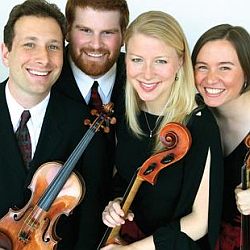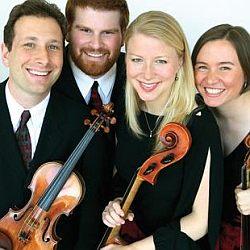
“There are two or three things you guys do which just blow me away,” Ruehr tells Kloetzel. “These really intricate lines that I’ve written, instead of just making them sound like a busy texture, you make them sound like a canon: Every line is clear, but it’s still working together. The other thing you do is the whole sense of line ... and the structure of the piece, from the first to the last movement, you really feel that there’s a journey that was very, very carefully put together. And then you have this sense of fluid tempo, which I love.”
Canons, changeups of tempo, and polyrhythms evocative of world music abound in Ruehr’s work. That’s only part of what the Cypress loves about her, as evidenced in its recording of three of her earlier quartets, to be released this month on the Quartet’s own label, CSQ (and made available online).
“She has a tremendous sense of melody,” testifies Kloetzel. “She writes melodies you want to sing, you want to go home humming. Mozart does the same, Schubert does the same, and I see the three of these composers as being linked in that way.”
In the tradition of “Call & Response,” those two older composers will share the Quartet’s program this month with Ruehr. Programs in past years have been designed to show the influence of the standard repertoire on a contemporary composer, but this year, for the first time, there’s a literary as well as a musical link between the three pieces.
“In Mozart’s quartet The Violet, which is K. 575, the second movement is based on a Goethe poem,” Kloetzel explains. “And in Schubert’s Death and the Maiden, the second movement is also based on a poem [by Matthias Claudius]. We’ve worked with Elena a lot, and we know how she loves to read, so she got to choose which text she wanted to work with.”
The choice, a 2001 novel of intrigue by Ann Patchett titled Bel Canto (HarperCollins), was easy for Ruehr. “It was one of those books I stayed up and read all night,” she points out. The principal female character is a celebrated soprano (the fictional Roxanne Coss); the other characters include a band of Latin American revolutionaries, a Japanese businessman, and several international diplomats, all of whom appealed to Ruehr’s affection for world music. Within her new quartet’s 10 short movements, the composer was able to embed a long-loved Japanese folk song, Sakura, as well as bits of pieces that Coss sings in the novel — or might sing — from Schubert, Dvořák, Puccini, and Barber.
Those composers (including Ruehr herself) and the history of classical music will be illuminated by Cypress as it extends its “Call & Response” project to Bay Area schools throughout this month, as well as to San Francisco’s Community Music Center on Capp St. (Feb. 6), the San Francisco Public Library’s Koret Auditorium (Feb. 25), and a concert at the Montalvo Art Center (Feb. 28). Ruehr will be present for the latter two events and for a preconcert talk at the Herbst on Feb. 26.
“Part of the idea behind ‘Call & Response’ is to show the audience that music is a natural evolution from an earlier time,” says Kloetzel. “There’s usually an ‘Aha! We can still do that today!’”

